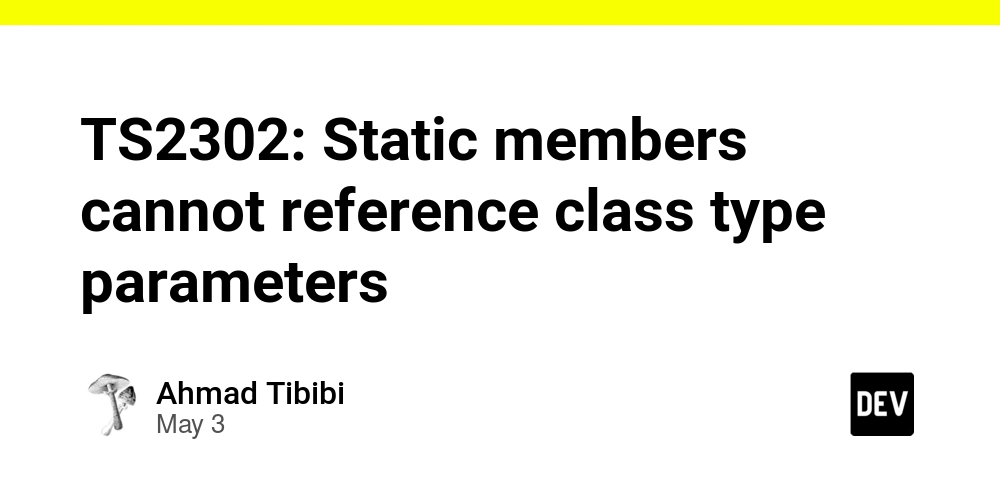TS2302: Static members cannot reference class type parameters
TS2302: Static members cannot reference class type parameters TypeScript is a powerful programming language that builds on JavaScript by adding static type definitions. At its core, TypeScript helps developers write safer and more predictable JavaScript programs by enforcing object shapes, providing robust error checking, and incorporating modern ECMAScript features. A "type" in TypeScript represents the different kinds of values a variable can take, such as strings, numbers, or objects, and ensures those values behave the way you expect throughout your program. For those who want to deepen their understanding of TypeScript or learn how to code with modern tools, I recommend bookmarking this blog and subscribing to stay up to date. Additionally, you can use AI-powered tools like GPTeach to expand your coding expertise and learn conveniently. This article focuses on explaining one common error in TypeScript: TS2302: Static members cannot reference class type parameters. But before fully diving into the details, let's take a closer look at a foundational concept of TypeScript: types. What Are Types? A "type" defines a structure or set of rules for a value. It ensures that a variable, parameter, or function return behaves as expected. For example: let age: number = 30; // `age` is declared as a number let name: string = "John"; // `name` must always hold a string Using types in TypeScript allows you to catch inconsistent or invalid code during compile time instead of runtime. For instance, trying to assign a string to a variable declared as a number will immediately produce an error: let score: number = "100"; // Error: Type 'string' is not assignable to type 'number' By enforcing these rules, TypeScript becomes a dependable tool for creating reliable and scalable JavaScript applications. TS2302: Static members cannot reference class type parameters When working with TypeScript’s class system, you might encounter the error TS2302: Static members cannot reference class type parameters. Let’s break this error down in simple terms and explore the issue with code examples. What Does "Static Members" Mean? In a TypeScript (or JavaScript) class, a static member is a property or method that is tied to the class itself and not to any specific instance. Static properties and methods can be accessed without creating an instance of the class. For example: class Example { static greet(): string { return "Hello, world!"; } } console.log(Example.greet()); // "Hello, world!" Here, greet is a static method that belongs to the class Example, and it can be called directly on the class. What Are "Class Type Parameters"? Type parameters in a class refer to generic type placeholders that allow a class to work with different types. A class type parameter is usually specified with angle brackets and allows you to make the class reusable across multiple data types. class Box { content: T; constructor(content: T) { this.content = content; } } const numberBox = new Box(123); // T is replaced with `number` const stringBox = new Box("TypeScript rules!"); // T is replaced with `string` In the above example, T is a class type parameter, and Box can hold number, string, or any other type. What Causes TS2302: Static Members Cannot Reference Class Type Parameters? The error TS2302: Static members cannot reference class type parameters occurs when a static property or method in a class tries to use a generic type parameter (like T) defined for the class. This happens because generic type parameters are specific to an instance of the class, while static members belong to the class itself—meaning they cannot assume or depend on instance-specific typing. Here’s an example that triggers this error: class MyClass { static value: T; // Error: TS2302: Static members cannot reference class type parameters } Here, value is a static member, but it tries to use the generic type parameter T. Since T is tied to instances of MyClass while static members are tied to the class, this is not allowed in TypeScript. How To Fix TS2302: Static members cannot reference class type parameters To fix the error, you need to avoid using instance-specific type parameters (T) in the static context. Depending on your needs, here are a few approaches to resolve the issue: 1. Remove the Use of T in Static Context If your static member does not require a T, remove its use entirely or replace it with a concrete type: class MyClass { static value: number; // Replaced `T` with a fixed type like `number` } 2. Use Non-Static Members for T You can convert the static member into an instance member that allows using the type parameter T: class MyClass { value: T; // No longer static, now works with `T` constructor(value: T) { this.value = value; } } const instance = new MyClass("Hello"

TS2302: Static members cannot reference class type parameters
TypeScript is a powerful programming language that builds on JavaScript by adding static type definitions. At its core, TypeScript helps developers write safer and more predictable JavaScript programs by enforcing object shapes, providing robust error checking, and incorporating modern ECMAScript features. A "type" in TypeScript represents the different kinds of values a variable can take, such as strings, numbers, or objects, and ensures those values behave the way you expect throughout your program.
For those who want to deepen their understanding of TypeScript or learn how to code with modern tools, I recommend bookmarking this blog and subscribing to stay up to date. Additionally, you can use AI-powered tools like GPTeach to expand your coding expertise and learn conveniently.
This article focuses on explaining one common error in TypeScript: TS2302: Static members cannot reference class type parameters. But before fully diving into the details, let's take a closer look at a foundational concept of TypeScript: types.
What Are Types?
A "type" defines a structure or set of rules for a value. It ensures that a variable, parameter, or function return behaves as expected. For example:
let age: number = 30; // `age` is declared as a number
let name: string = "John"; // `name` must always hold a string
Using types in TypeScript allows you to catch inconsistent or invalid code during compile time instead of runtime. For instance, trying to assign a string to a variable declared as a number will immediately produce an error:
let score: number = "100"; // Error: Type 'string' is not assignable to type 'number'
By enforcing these rules, TypeScript becomes a dependable tool for creating reliable and scalable JavaScript applications.
TS2302: Static members cannot reference class type parameters
When working with TypeScript’s class system, you might encounter the error TS2302: Static members cannot reference class type parameters. Let’s break this error down in simple terms and explore the issue with code examples.
What Does "Static Members" Mean?
In a TypeScript (or JavaScript) class, a static member is a property or method that is tied to the class itself and not to any specific instance. Static properties and methods can be accessed without creating an instance of the class. For example:
class Example {
static greet(): string {
return "Hello, world!";
}
}
console.log(Example.greet()); // "Hello, world!"
Here, greet is a static method that belongs to the class Example, and it can be called directly on the class.
What Are "Class Type Parameters"?
Type parameters in a class refer to generic type placeholders that allow a class to work with different types. A class type parameter is usually specified with angle brackets
class Box<T> {
content: T;
constructor(content: T) {
this.content = content;
}
}
const numberBox = new Box<number>(123); // T is replaced with `number`
const stringBox = new Box<string>("TypeScript rules!"); // T is replaced with `string`
In the above example, T is a class type parameter, and Box can hold number, string, or any other type.
What Causes TS2302: Static Members Cannot Reference Class Type Parameters?
The error TS2302: Static members cannot reference class type parameters occurs when a static property or method in a class tries to use a generic type parameter (like T) defined for the class. This happens because generic type parameters are specific to an instance of the class, while static members belong to the class itself—meaning they cannot assume or depend on instance-specific typing.
Here’s an example that triggers this error:
class MyClass<T> {
static value: T; // Error: TS2302: Static members cannot reference class type parameters
}
Here, value is a static member, but it tries to use the generic type parameter T. Since T is tied to instances of MyClass while static members are tied to the class, this is not allowed in TypeScript.
How To Fix TS2302: Static members cannot reference class type parameters
To fix the error, you need to avoid using instance-specific type parameters (T) in the static context. Depending on your needs, here are a few approaches to resolve the issue:
1. Remove the Use of T in Static Context
If your static member does not require a T, remove its use entirely or replace it with a concrete type:
class MyClass<T> {
static value: number; // Replaced `T` with a fixed type like `number`
}
2. Use Non-Static Members for T
You can convert the static member into an instance member that allows using the type parameter T:
class MyClass<T> {
value: T; // No longer static, now works with `T`
constructor(value: T) {
this.value = value;
}
}
const instance = new MyClass<string>("Hello");
3. Use a Generic Function Instead of a Static Member
If generics are needed in the static context, use a static generic function instead:
class MyClass {
static createValue<T>(value: T): T {
return value;
}
}
const value = MyClass.createValue<string>("Hello");
console.log(value); // "Hello"
Using a static generic method allows you to pass the type parameter explicitly, enabling static members to handle generic logic.
Important to Know!
Static members are shared across all instances: This is why they cannot depend on instance-specific behavior, including generic type parameters tied to instances.
Generic type parameters are scoped to instances: They define the specific typing for individual objects created from the class and are not known at the class level.
FAQ: Common Questions Around TS2302
Q: Why can’t static members reference instance-specific types?
Static members exist on the class (not any instance), so they don’t know which instance-specific type parameter to use. Trying to reference these parameters would lead to ambiguity.
Q: Is there a way to handle generics in a static member?
Yes, use static generic functions instead of class type parameters. This allows you to pass the type directly to the function.
Q: Are there similar errors to TS2302?
Yes, errors like TS2322 ("Type 'X' is not assignable to type 'Y'") often result from misunderstandings around generics, class design, or static property usage.
Conclusion
The error TS2302: Static members cannot reference class type parameters highlights the difference between static context and instance-specific type parameters in TypeScript. By understanding how static works and using appropriate patterns, such as static generic functions or fixed types, you can avoid this error and write cleaner, type-safe code.
To master TypeScript and streamline your journey into type-safe programming, consider subscribing to this blog for more insights or try tools like GPTeach for enhanced learning.





































































































































































![[The AI Show Episode 145]: OpenAI Releases o3 and o4-mini, AI Is Causing “Quiet Layoffs,” Executive Order on Youth AI Education & GPT-4o’s Controversial Update](https://www.marketingaiinstitute.com/hubfs/ep%20145%20cover.png)



























































































































![[DEALS] Microsoft 365: 1-Year Subscription (Family/Up to 6 Users) (23% off) & Other Deals Up To 98% Off – Offers End Soon!](https://www.javacodegeeks.com/wp-content/uploads/2012/12/jcg-logo.jpg)




![From Art School Drop-out to Microsoft Engineer with Shashi Lo [Podcast #170]](https://cdn.hashnode.com/res/hashnode/image/upload/v1746203291209/439bf16b-c820-4fe8-b69e-94d80533b2df.png?#)









































































































(1).jpg?#)































_Inge_Johnsson-Alamy.jpg?width=1280&auto=webp&quality=80&disable=upscale#)











































































































![Apple to Split iPhone Launches Across Fall and Spring in Major Shakeup [Report]](https://www.iclarified.com/images/news/97211/97211/97211-640.jpg)
![Apple to Move Camera to Top Left, Hide Face ID Under Display in iPhone 18 Pro Redesign [Report]](https://www.iclarified.com/images/news/97212/97212/97212-640.jpg)
![Apple Developing Battery Case for iPhone 17 Air Amid Battery Life Concerns [Report]](https://www.iclarified.com/images/news/97208/97208/97208-640.jpg)
![AirPods 4 On Sale for $99 [Lowest Price Ever]](https://www.iclarified.com/images/news/97206/97206/97206-640.jpg)

































![[Updated] Samsung’s 65-inch 4K Smart TV Just Crashed to $299 — That’s Cheaper Than an iPad](https://www.androidheadlines.com/wp-content/uploads/2025/05/samsung-du7200.jpg)



































































